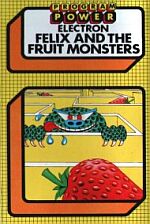Acornsoft was the software arm of Acorn Computers, and a major publisher of software for the BBC Micro and Acorn Electron. As well as games, it also produced a large number of educational titles, extra computer languages and business and utility packages – these included word processor VIEW and the spreadsheet ViewSheet supplied on ROM and cartridge for the BBC Micro/Acorn Electron and included as standard in the BBC Master and Acorn Business Computer.
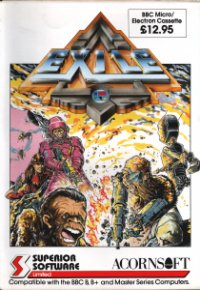
Exile is a single-player action-adventure video game originally published for the BBC Micro and Acorn Electron in 1988 by Superior Software and later ported to the Commodore 64, Amiga, CD32 and Atari ST, all published by Audiogenic. The game was designed and programmed by Peter Irvin and Jeremy Smith. It is often cited as one of the earliest examples of a Metroidvania game and featured "realistic gravity, inertia and object mass years before players understood the concept of a physics engine... an astounding level of AI, stealth-based gameplay, a logical ecosystem governing the world's creatures and a teleportation mechanic that feels startlingly like a predecessor to Portal".

Repton is a computer game originally developed by 16-year-old Briton Tim Tyler for the BBC Micro and Acorn Electron and released by Superior Software in 1985. The game spawned a series of follow up games which were released throughout the 1980s. The series sold around 125,000 copies between 1985 and 1990 with Repton 2 selling 35,000 itself. The games have since been remade for several modern systems, including iRepton for the iPhone / iPod Touch in 2010, and Android Repton 1, Android Repton 2 and Android Repton 3 from 2016 to 2018.

Citadel is a computer game developed by Michael Jakobsen for the BBC Micro, and released by Superior Software in 1985. It was also ported to the Acorn Electron. Centred around a castle, this platform game with some puzzle-solving elements requires players to find five hidden crystals and return them to their rightful place. It also features some outside areas external to the castle.

Frak! is a scrolling platform video game programmed by Nick Pelling for the BBC Micro and Acorn Electron and published by his own Aardvark Software in 1984. It was ported to the Commodore 64 the following year by "The B Team". The BBC and Electron versions were included on the Superior Software compilation Play It Again Sam 4 in 1987 and re-issued in budget form by Alternative Software in 1989.
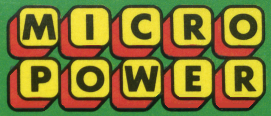
Micro Power was a British company established in the early 1980s by former accountant Bob Simpson. The company was best known as a video game publisher, originally under the name Program Power. It also sold many types of computer hardware and software through its Leeds 'showroom' or via mail order.
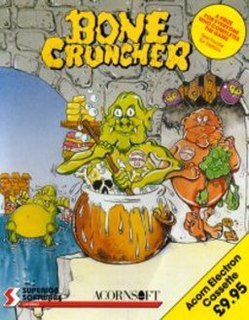
Bone Cruncher is a puzzle video game for the Acorn Electron, BBC Micro, and Commodore 64 first published by Superior Software in 1987. It uses the "rocks and diamonds" mechanics of Boulder Dash. An Amiga version was released in 1988.
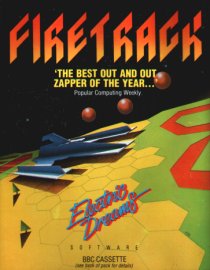
Firetrack is a vertically-scrolling shooter programmed by Nick Pelling and released for the BBC Micro and Commodore 64 platforms in 1987 by Electric Dreams Software. It was also ported to the Acorn Electron by Superior Software in 1989 as part of the Play It Again Sam 7 compilation. It resembles the 1984 arcade game Star Force in style and gameplay. The game was technically advanced and very well received by critics.

Snapper is a clone of the Namco arcade game Pac-Man programmed by Jonathan Griffiths for the BBC Micro and released as one of the launch titles for Acornsoft in 1982. It was also one of Acornsoft's launch titles for the Acorn Electron in 1983.
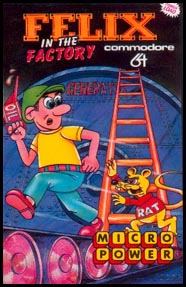
Felix in the Factory is a platform game written by John Chaytor for the BBC Micro and published by Micro Power in 1982. Versions were released for the Acorn Electron (1983), Commodore 64 (1984), and Memotech MTX (1984). It is the first in a trilogy of Micro Power games featuring the factory worker Felix and was followed by Felix and the Fruit Monsters and another factory-based platformer, Felix meets the Evil Weevils.

Elixir is a video game for the Acorn Electron and BBC Micro released in 1987 by Superior Software. It is a platform game in which the player takes the role of a shrunken scientist.

Business Games is a collection of two business simulation games for the BBC Micro published in 1983 by Acornsoft. An Acorn Electron version followed in 1984. The included games are Stokmark and Telemark.

Ghouls is a platform game written by David Hoskins and published in the UK by Micro Power. It was released on the Acorn Electron, BBC Micro, Commodore 64 and Amstrad CPC in 1984.

Stock Car is an overhead-view racing video game written by A. W. Halse and published in the UK by Micro Power. It was released in 1984 for the BBC Micro, Acorn Electron, and Commodore 64 computers. Although the cassette inlay gives the release date as 1984, some sources state the release date as 1983, and the game is also known as Stock Car Racer.

Deathstar is multidirectional shooter for the Acorn Electron and BBC Micro developed by Peter Johnson and originally published in the UK by Superior Software in 1985. It is a clone of the arcade game Sinistar.
Diamond Mine is a video game first published by MRM Software for the Acorn Electron and BBC Micro home computers in 1984. Diamond Mine was reissued by Blue Ribbon in 1985 and ported to other systems in 1985 and 1986. Blue Ribbon released a sequel, Diamond Mine II, at the same time. Both games are similar to the 1983 game Oil's Well, which itself is a re-themed version of the 1982 Anteater arcade game.

Jet-Boot Jack is a platform game written by Jon Williams for the Atari 8-bit family and published by English Software in 1983. It was ported to the Acorn Electron, Amstrad CPC, BBC Micro, and Commodore 64. A C64-only sequel, Legend of the Knucker-Hole, was released in 1984.

Perplexity is a video game created by Ian Collinson for the Acorn Electron and BBC Micro and published by Superior Software in 1990. It is a pseudo 3D maze game with Sokoban-style puzzles.
